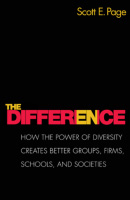
The Difference
by Scott Page
Lots of people have heard about the concept of the Wisdom of Crowds. When I read the book of that name by James Surowiecki in 2004, it kinda threw me for a loop.
All throughout my professional career up to that point, I had worked under the assumption that expertise was all important. After all, why would anyone ask a non-expert anything about any subject to which the person doesn’t have a clue? On the surface it seems dumb. Lots of smart commentators have said over time that the stupid unwashed masses are just that, stupid and unwashed and ought not to be listened to. But after reading Surowiecki, I started thinking more about and taking into account the inputs of average people who were not experts in a particular field when it came time for planning in military and business operations. But Surowiecki’s book was often attacked by those very “smart guy experts” that Surowiecki said ought to be avoided. They said his book was a Gladwell-like collection of anecdotes and not a research program with empirical results.
Then along comes Scott Page, Professor of Complex Systems, Political Science and Economics at the University of Michigan. Page takes Surowiecki’s concept and puts it to rigorous empirical testing.
Page notes that “Empirical evidence shows that people who construct different ways of life also construct different ways of life also construct different interpretations and perspectives. This can result in different predictive models and should create incentives for learning and heuristics.” This is a tremendous challenge to organizational leaders who reflexively bring in “experts” to advise on courses of action. Page lays out empirical evidence that diversity nearly always trumps expertise. Diversity not merely of skin color, but of background, perspective and experience. And Page finds that the benefits of diversity do really exist, and if leveraged make any organization better.
The implications for this empirical finding ought to make leaders think twice about how they develop future leaders. Selecting and pushing forward people who look like them and have the same experience is a dangerous path to put your organization on. It is tough to bring in outsiders and those with differing views. It can make leaders question their own experiences as relevant. But setting aside personal egos, those that look deliberately work to expand their world view, and who seek to diversify the worldviews of their organizations, will have a leg up on the competition and make their organizations places where all can get better.

Leave A Comment